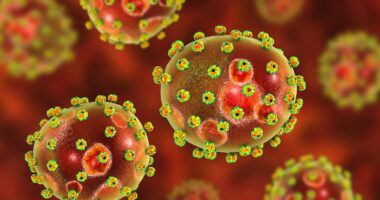In the early days of the COVID-19 pandemic it was unsure what the lasting effects of the virus would be. Very quickly though it became clear that some patients were unable to shake off the symptoms.
Many people infected will make a full recovery from Covid in 12 weeks. But in the case of those with long Covid, or post-Covid syndrome, this can last longer.
There is currently no cure for long Covid and patients are having to find ways to manage and live with their symptoms, which can be debilitating. There are four common symptoms of long Covid, including extreme tiredness (fatigue), feeling short of breath, loss of smell and muscle aches.
It is thought around two million people in the UK are living with long Covid. And now experts are warning this number could be set to rise as the region sees another surge in coronavirus cases this winter.
The latest figures from the UK Health Security Agency (UKHSA) revealed a 36 percent rise in Covid cases in the week up to December 13 compared to the previous week.
Experts have warned as many as 100,000 people, including children, could be at risk of developing long Covid in the coming weeks.
Speaking to the i newspaper, Professor Steve Griffin, an academic in cancer virology at the University of Leeds, said: “Most upsettingly, this will include children and young people, which are often overlooked when it comes to this dreadful disease and are left exposed due to the total lack of proper mitigations in schools.”
And healthcare data scientist from University College London, Prof Christina Pagel, said: “I think it will be tens of thousands certainly, but it’s quite possible it will be one to two hundred thousand.”
She stressed that “that’s a very rough estimate and there’s a lot of variability by age, sex, vaccination history and other health conditions”.
“My personal feeling is that this wave will be as high as the large waves of 2022, and possibly even the highest so far, in terms of infections, but that hospitalisations with Covid will not reach the highs of 2022 – and will be nowhere near the highs of the pre-vaccination Covid waves,” she added.
Prof Pagel estimated there is currently a two percent chance of developing long Covid from an infection.
One strain of Covid has been linked to the recent surges in cases. The JN.1 subvariant has emerged as a dominant strain in the last few weeks.
Data has shown it went from accounting for just one percent of Covid cases at the end of October to five per cent by mid-November.
It has since reached 51 percent on Christmas Day.
JN.1 is a descendant of the Pirola variant which came from the Omicron strain.
It has been detected in multiple countries including the UK, Spain, Iceland, US, India and China.
The World Health Organisation (WHO) identified it as a “variant of interest”, meaning it is being monitored.
Prof Lawrence Young, a virologist at Warwick University, urged eligible people to come forward for their vaccinations.
He told the i: “The current wave of Covid will inevitably result in thousands of new cases of Long Covid.
“Vaccination against Covid reduces the severity and duration of long Covid but restricted access to the latest booster jab – only the over 65s, clinical vulnerable and healthcare workers are eligible – means that many people are more likely to suffer the acute and long-term effects of Covid.”
Common symptoms of long Covid include extreme tiredness (fatigue), feeling short of breath, loss of smell and muscle aches.
According to the NHS, other symptoms include:
- Problems with your memory and concentration (“brain fog”)
- Chest pain or tightness
- Difficulty sleeping (insomnia)
- Heart palpitations
- Dizziness
- Pins and needles
- Joint pain
- Depression and anxiety
- Tinnitus, earaches
- Feeling sick, diarrhoea, stomach aches, loss of appetite
- A high temperature, cough, headaches, sore throat, changes to sense of smell or taste
- Rashes.
If you think you have long Covid you should speak to your GP.








